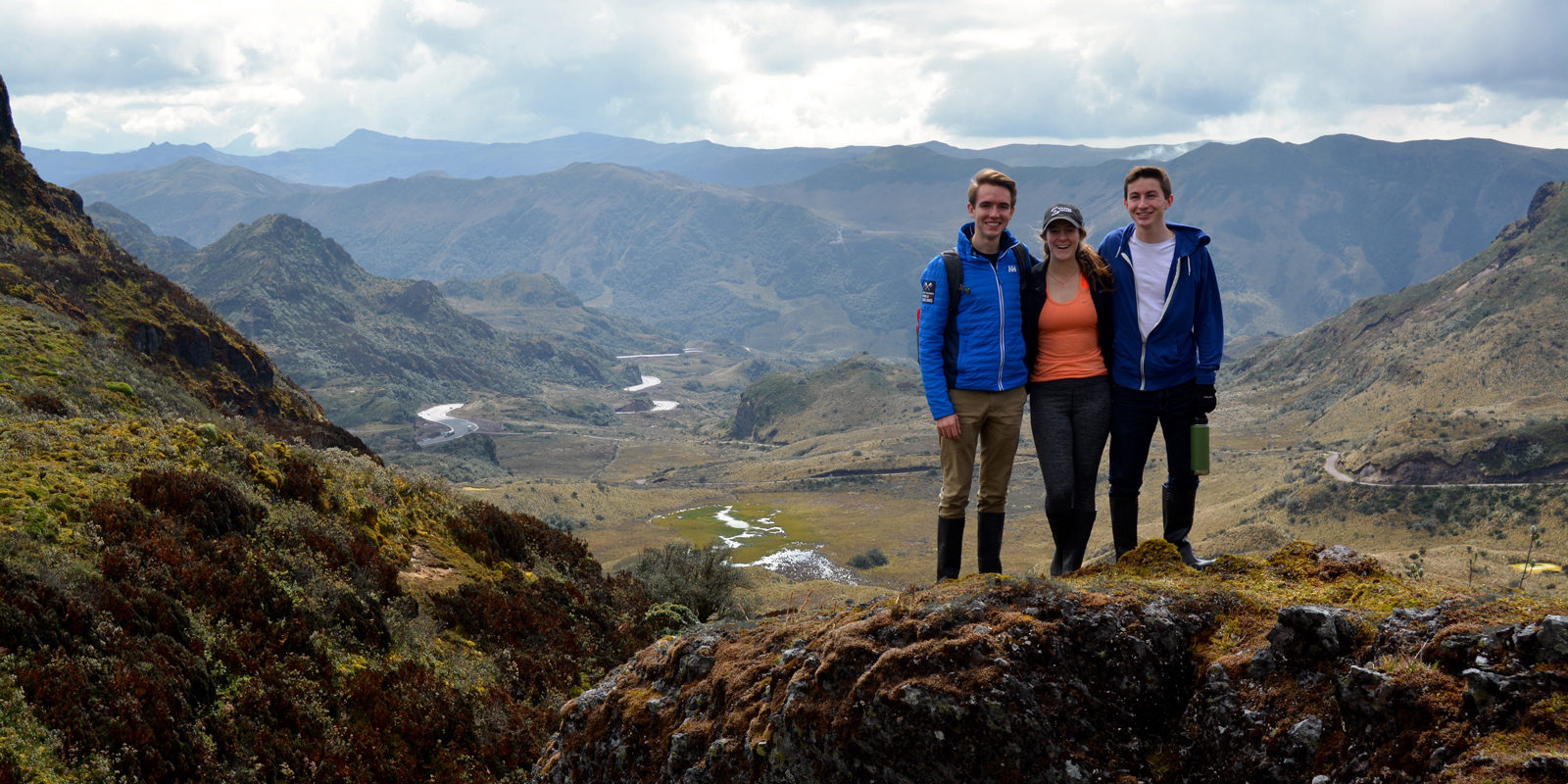Freshman Nicki Truby will never forget the 10-day winter-break trip she took to Ecuador this year, along with leader Catherine Woodward (a botany faculty associate) and other freshman members of a First-Year Interest Group (FIG) called Tropical Ecology and Conservation.
“We were studying the eating habits of woolly monkeys,” Truby recalls. “That was complicated. Monkeys are on the move and you have to move with them. We relied on compasses and marking tape to keep from getting lost in the jungle. There was no cell coverage. The research station was very isolated.”
A FIG is a group of about 20 freshman students who register for the same three classes linked by a common theme. They are led by instructors in seminar courses that help students discover interdisciplinary linkages during the course of a semester. The idea is to deepen the learning experience.
It also turns out to be a lot of fun, says Truby.
“We studied together, we got dinner after tests, we talked about how the things we were learning intermingled with one another,” she says. “The cohort is just awesome for making friends and launching your UW experience.”
It’s amazing to take what we learned in the classroom and apply it in the real world.
Woodward’s popular FIG includes the ecology seminar — Rainforests and Coral Reefs — plus General Chemistry and one of four Spanish classes. During winter break, the group takes an optional trip to Ecuador where students put their knowledge to work on focused research projects in the Amazon rain forest. (See the complete list of FIGs here.)
Truby said the experience taught her a lot about how tropical ecology research works — including things outside the realm of science.
“I used my Spanish a lot because our guide spoke only Spanish,” she says. “It’s amazing to take what we learned in the classroom and apply it in the real world.”
Students and faculty say the FIG concept, which began in 2001 and is administered by the College of Letters and Science, connects freshmen socially and academically and helps bring the university’s large scale down to a more personal level.
“Many freshmen end up in classes with hundreds of students,” Woodward says. “It’s hard for professors to have meaningful relationships at that stage, when there are so many students. Here, the freshmen get individual attention.”
This spring, US News & World Report cited UW-Madison’s FIGs program as one of twenty “stellar examples” of learning communities at colleges and universities across the country.
The relationships built in FIGs are often lasting. A few years ago, freshmen in Harry Brighouse’s Children, Marriage and Families FIG asked the philosophy professor to create a follow-up class they could take as a group of juniors.
Brighouse developed the class, called Love, Sex and Friendship. “It’s great seeing how their writing and thinking is improved as juniors. Some came into the FIG minimally connected, and now are fully excited,” Brighouse says.
FIGs, Brighouse says, shape better students and stronger teachers.
“They get to know a small group of fellow students, not through the dorms or parties or student orgs, but because they are reading and discussing the same academic material,” he says.
When Brighouse began teaching a FIG in 2007, he found that it also challenged him as a teacher.
“I’m a better teacher at all levels. It’s driven by seeing how inadequate I was with that first group of FIG students,” he says. “Because of that, I think in terms of how much the students learn and not how much I teach.”
Students have seen FIGs influence their academic careers.
Colin Higgins enrolled in English Professor Lynn Keller’s FIG seminar Nature and Culture: How Humans Interact with the Natural Environment in 2011, thinking he wanted to be an ecologist. But reading an essay by William Cronon, UW-Madison professor of history, geography and environmental studies, titled “The Trouble with Wilderness,” changed that.
“It fundamentally redefined my path and began my interest in geography,” says Higgins. “The depth of experience, covering deep discussions of problems in introductory ecology as well as an introduction to 20th-century environmental thought allowed me to see the nuance and complexity … of many socio-economic issues.”
In fact, Higgins — who graduated last May with a triple major with comprehensive honors in history, geography and environmental science — used two essays he read in that FIG during his 2015 interview as a candidate for a coveted Rhodes Scholarship, which he won.
Woodward often forwards job opportunities, writes letters of recommendation, and goes to movies and lectures with former students.
“We form a community of learners and friends where the relationship doesn’t end when you walk out of the lecture hall,” she says.
For more information about the FIGs program, contact Nathan Phelps.


